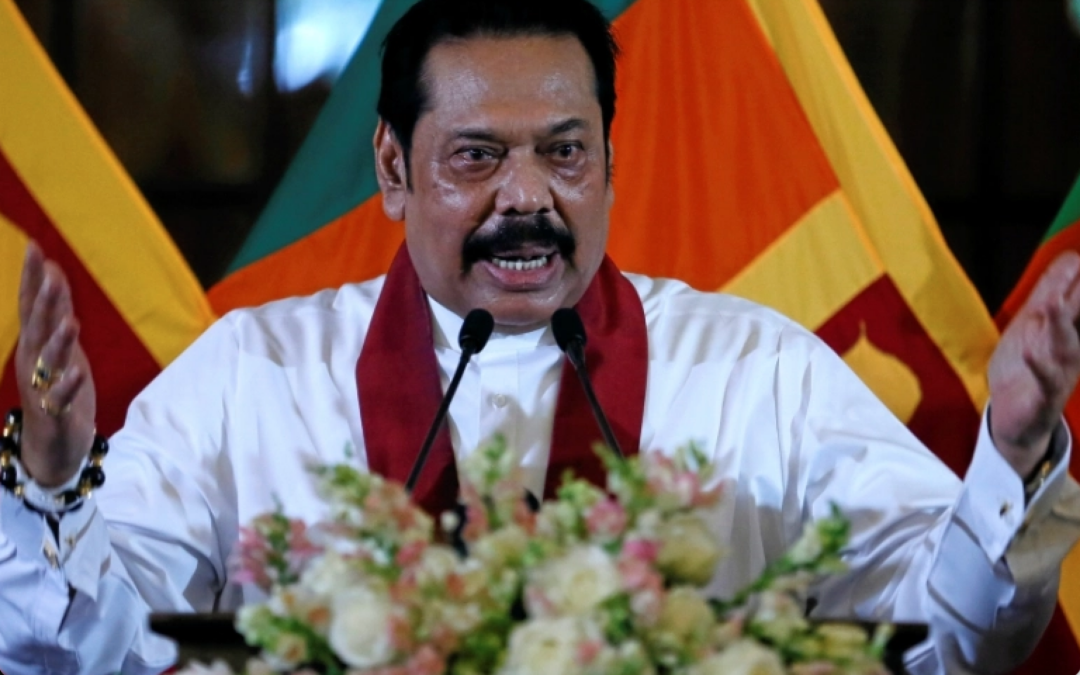
Apr 23, 2021 | News
The parliamentary resolution tabled by Prime Minister Mahinda Rajapaksa would aggravate Sri Lanka’s culture of impunity and undermine the rule of law, said the ICJ today.
The Resolution tabled on 9 April seeks the approval of the Sri Lankan Parliament to stop ongoing trials against military officials and other high-ranking officials accused of serious human rights violations, as well as family members of the President and Prime Minister currently facing charges of corruption.
“The Parliament should categorically reject this ‘impunity resolution’ that interferes with the ongoing work of the judiciary and the Attorney General’s office in their efforts to provide for at least a modicum of accountability for serious violations,” said Ian Seiderman, ICJ’s Legal and Policy Director.
The Resolution seeks parliamentary approval to implement the recommendations of the so-called Commission of Inquiry on Political Victimization (COI), which were presented to President Gotabaya Rajapaksa last December. The COI and its work have been widely discredited as an affront to the independence of judiciary and the rule of law and its report has not been made available to the public.
“The report by the COI calls for the withdrawal of investigations and convictions even in the handful of cases of serious human rights violations that have been brought before courts, including in cases where perpetrators have been convicted,” Seiderman said.
The recommendations made by the COI that would be implemented by the Resolution include the withdrawal of indictments filed by the Attorney- General and the discharge of several accused in cases that have been recognized as emblematic and referred to in the report of the UN High Commissioner for Human Rights and in UNHRC Resolution 46/1. They also included similar dropping of cases of serious financial misappropriation.
Examples of emblematic cases where the COI recommends discharge of the accused include the case of alleged abductions of 11 persons by members of the Navy including Admiral Wasantha Karannagoda; unlawful killings of Tamil National Alliance MP Nadaraja Raviraj, Wasim Thajudeen, Sunday Leader Editor Lasantha Wickrematunge, Tamil National Alliance MP Joseph Pararajasingam; the alleged enforced disappearance of journalist Prageeth Ekneligoda; and the abduction of Editor Keith Noayhr.
In certain cases that have resulted in convictions for murder or torture, including one case affirmed on appeal to the Supreme Court, the COI has recommended that the Attorney-General review the convictions and discharge the accused.
“The recommendations of the COI, incorporated in this “impunity resolution”, constitute an interference with the independent functioning of the judiciary as judicial decisions and court proceedings have been reassessed outside the judicial structure,” Seiderman stated. “Involving the Parliament in giving effect to these recommendations is contrary to the principle of separation of powers as provided for in the Sri Lankan Constitution.”
The UN Basic Principles on the Independence of the Judiciary makes clear that “the judiciary shall have jurisdiction over all issues of a judicial nature and shall have exclusive authority to decide whether an issue submitted for its decision is within its competence as defined by law” and that “there shall not be any inappropriate or unwarranted interference with the judicial process, nor shall judicial decisions by the courts be subject to revision.”
The recommendations by the COI go even further and recommend the prosecution of investigators, lawyers and prosecutors in those cases under the Penal Code and the Bribery Act for “fabrication” of evidence and corruption.
“Recommending that action be taken against lawyers and prosecutors for carrying out their professional and statutory duties is an all-out assault on a free and independent bar and this recommendation must be summarily rejected,” Seiderman said.
The UN Basic Principles on the Role of Lawyers obliges the State to ensure that lawyers “are able to perform all of their professional functions without intimidation, hindrance, harassment or improper interference” and that they “shall not suffer, or be threatened with, prosecution or administrative, economic or other sanctions for any action taken in accordance with recognized professional duties, standards and ethics.”
The UN Guidelines on the Role of Prosecutors establish that “States shall ensure that prosecutors are able to perform their professional functions without intimidation, hindrance, harassment, improper interference or unjustified exposure to civil, penal or other liability.”
Contact
Osama Motiwala, ICJ Asia-Pacific Communications Officer, e: osama.motiwala(a)icj.org
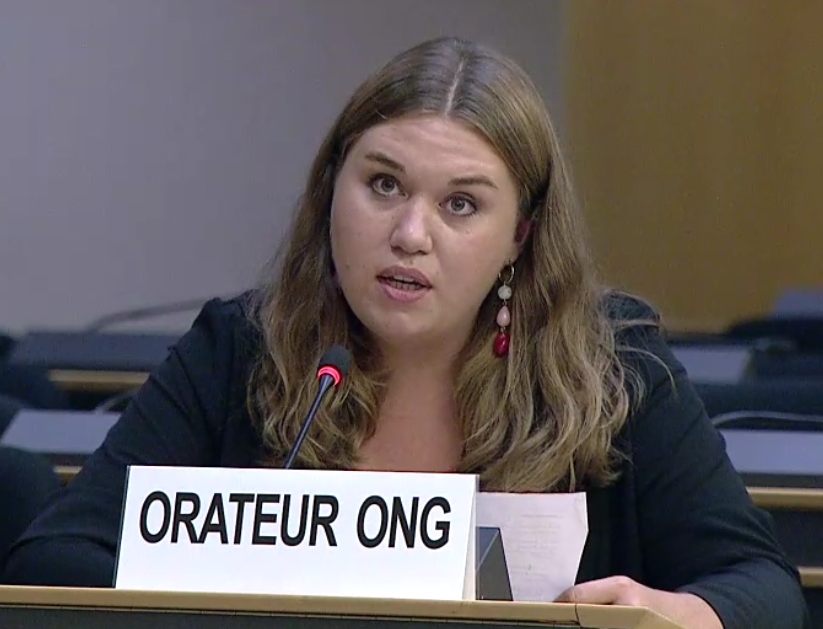
Sep 24, 2020 | Advocacy, Non-legal submissions
The ICJ today highlighted the continuing impunity in Venezuela, reinforced by lack of judicial independence, at the UN Human Rights Council in Geneva.
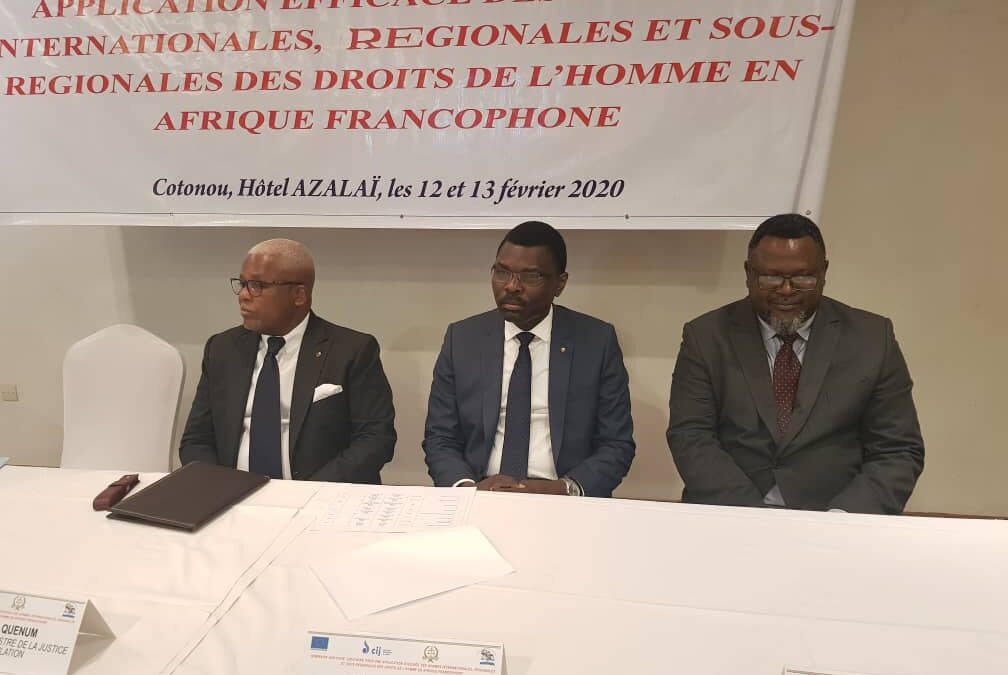
Feb 13, 2020 | News
From 12-13 February, the ICJ, in collaboration with the Supreme Court of the Republic of Benin and the African Association of the Francophone Higher Jurisdictions, hosted regional judicial dialogue and training for effective implementation of human rights in francophone Africa in Cotonou.
The President of the Constitutional Court of Benin, Justice Joseph Duogbenou, the Vice President of the ECOWAS Community Court of Justice, Justice Ouattara Gberi Be and the President of the High Court of Benin, Lady Justice Marie Cecile de Dravo Zinzindohoue were among the participants.
Judges and other jurists representing the Supreme Courts and Constitutional Courts of Benin, Burkina Faso Cameroon, DR Congo, Gabon, Guinea, Côte d’Ivoire, Mali, Niger, Senegal and Togo also participated.
President Patrice Talon, who was represented by the Minister of Justice and the Legislature, M. Maxime Ouenum, opening the ceremony, noted that ‘fundamental rights and freedoms are binding on legislative, executive and judicial authorities because of the Constitutional, Conventional and National protection they enjoy’. They therefore ‘create obligations on states and on those who act on behalf of states, they cannot be ignored, denied or discarded’.
President of the Supreme Court of Benin, M. Ousmane Batoko emphasized the need to strengthen the capacity of judges for a more effective application of international human rights law in domestic adjudication. According to Justice Batoko, ‘The judge is at the very heart of the day to day construction and perpetuation of international human rights law.
‘’The protection of human rights goes beyond international and national legislation, and requires active protection by judges in the court rooms across Africa‘‘ said Arnold Tsunga, ICJ’s Africa Regional Director. He expressed hope that the dialogue would help to ensure that African peoples enjoy their human rights in totality. “The architecture for the protection of human rights can only be effective when national judges are equipped to play the very vital role that they have as the first layer of protection available to victims of human rights violations,“ Tsunga added.
At the end of the two-day programme which included lectures and judicial conversations, participants adopted a communique in which they affirmed their continued commitment to the promotion and protection of human rights in Africa expressing a desire for such colloquia to be held more frequently in order to build the capacity of the judiciaries in West Africa.
Contact
Arnold Tsunga, ICJ Regional Director for Africa, t: +27 716405926 or +263 777 283 249: e: arnold.tsunga@icj.org
Solomon Ebobrah, Senior Legal Adviser (ARP), t: +234 803 492 7549, e: Solomon.ebobrah@icj.org
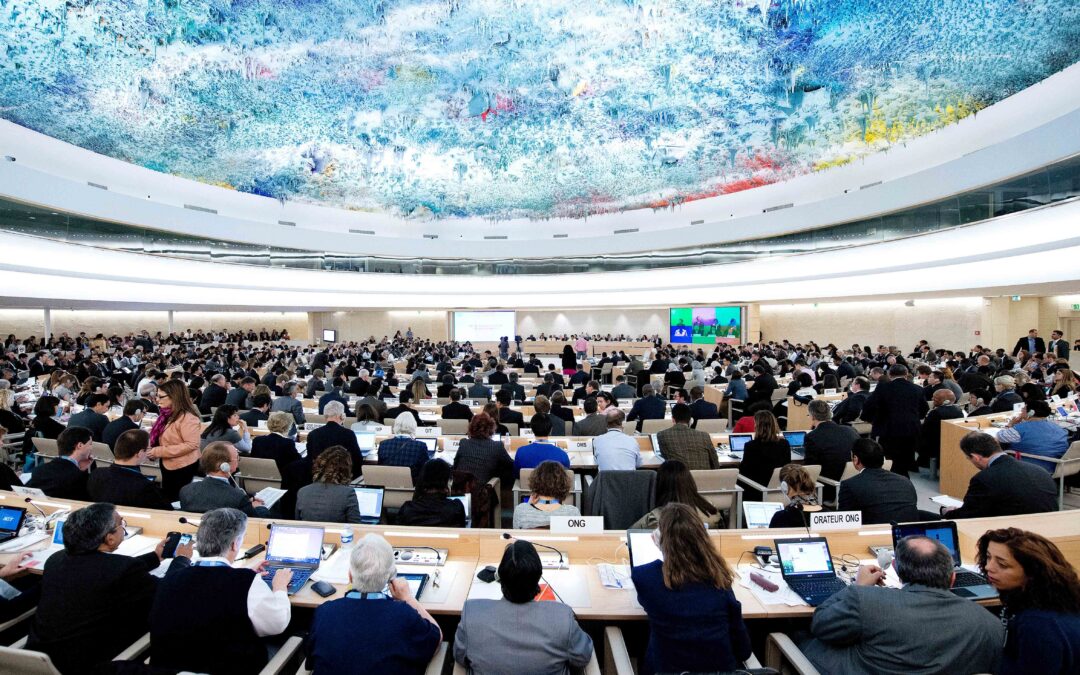
Jun 12, 2017 | Advocacy, Non-legal submissions
Speaking at the UN Human Rights Council, the ICJ today highlighted judicial corruption and threats to judges and lawyers in Turkey and Azerbaijan, as well as regressive steps on violence against women in the United States of America and Russian Federation.
The statement, delivered during the interactive dialogue with the UN Special Rapporteur on Independence of Judges and Lawyers and the UN Special Rapporteur on Violence against Women, was as follows:
“The ICJ warmly welcomes the new Special Rapporteur on Independence of Judges and Lawyers. As he has highlighted, ensuring judges are accountable for corruption and human rights violations, while respecting judicial independence, should be a global priority. Our Practitioners’ Guide on Judicial Accountability, published last year, should be of particular use to the Rapporteur and other actors in this regard.
Several situations serve as stark examples of other issues raised in his report. In Turkey, recent constitutional amendments give the President and Parliament control over the judiciary’s governing body. This has undermined the judiciary’s independence, already threatened by the mass dismissal of judges and the state of emergency. Lawyers and legal scholars, among others, are routinely dismissed or threatened by the authorities.
In Azerbaijan, the Bar Association is not independent and does not protect its members against undue interference with the exercise of their professional duties. Rather, it often serves as a tool of retaliation against independent human rights lawyers, including through disbarment proceedings that contravene international standards.
We would ask the Special Rapporteur for his views on the role his mandate can play in these and similar situations.
The ICJ also welcomes the report of the Special Rapporteur on violence against women.
Despite increasing global acknowledgement of the grave and systemic nature of violence against women, some States continue to introduce regressive legislation undermining protections for women. For example, the Russian Federation’s decriminalization of certain forms of domestic violence, and attempts in some parts of the United States of America to restrict availability of sexual and reproductive healthcare, particularly impact on victims of sexual violence. The Philippines’ President’s public statements disregarding the gravity of sexual violence are another example. The ICJ would ask the Special Rapporteur what can be done to prevent such backsliding?”
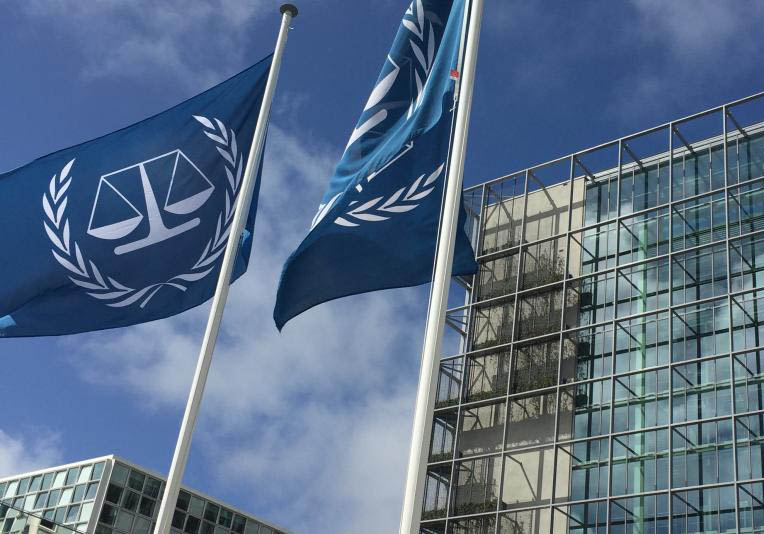
Apr 10, 2017 | News
Zambia should reaffirm its membership in the International Criminal Court to best advance justice for victims of atrocities, a group of African organizations and international nongovernmental organizations – including the ICJ – with a presence in Africa said today.
Zambia’s government began public consultations on the country’s ICC membership the week of March 27, 2017.
This was in response to the African Union summit’s adoption in January of an “ICC withdrawal strategy.”
An unprecedented 16 countries, including Zambia, entered reservations to this decision.
Zambia has been a role model on the continent in matters of peace, democracy, and human rights. Leaving the ICC would erode the country’s leadership and threaten respect for the rights of victims of the most brutal crimes across Africa, the group of organizations said.
As a member of the Southern Africa Development Community (SADC), Zambia has a proud history in the establishment of the ICC, they added.
SADC was active in the diplomatic conference in Rome in 1998 where the ICC’s treaty was finalized after six weeks of negotiations.
SADC members developed 10 principles for an effective, independent, and impartial court at a meeting in Pretoria in 1997.
The ICC is a groundbreaking achievement in the fight against impunity, the organizations said.
It is the first and only global criminal court that can prosecute individuals responsible for atrocities.
It is a court of last resort in that it has the authority to try genocide, war crimes, and crimes against humanity committed since 2002, but only when national courts are unable or unwilling to investigate and prosecute.
Since the court’s treaty opened for signature in 1998, 124 countries have become members.
Zambia signed the ICC’s Rome treaty on July 17, 1998, the day it opened for signature, and ratified the treaty on November 13, 2000.
The ICC faces many challenges in meeting the expectations of victims of mass atrocities and member countries, the organizations said.
Its inability to reach crimes committed in some powerful countries and their allies is a cause for deep concern, even as claims that the ICC is targeting Africa are not supported by the facts.
The court’s reach is limited to crimes committed on the territories of countries that have joined the court or offered the court authority on its territory, absent a referral by the United Nations Security Council.
The majority of ICC investigations in Africa have arisen in response to requests or grants of authority by governments in the countries where the crimes were committed – as in Central African Republic, Côte d’Ivoire, Democratic Republic of Congo, Mali, and Uganda – or through referrals by the UN Security Council – as in Darfur, Sudan and Libya.
The ICC has faced backlash from some African leaders since it issued arrest warrants for Sudanese President Omar al-Bashir for alleged genocide, war crimes, and crimes against humanity in Darfur in 2009 and 2010.
In 2016, evidence of the backlash reached new heights when South Africa, Burundi, and Gambia announced they would withdraw from the court, the first countries to take such action.
Gambia has rescinded its withdrawal and South Africa is also re-examining withdrawal, making Burundi the only country to have maintained its withdrawal.
Under the ICC Statute, withdrawal goes into effect one year after the state party submits a notification to the UN Secretary-General.
In the wake of the announced withdrawals, many African countries – including Botswana, Burkina Faso, Côte d’Ivoire, Democratic Republic of Congo, Ghana, Lesotho, Mali, Malawi, Nigeria, Senegal, Sierra Leone, Tanzania, and Tunisia – have affirmed their commitment to remain in the ICC and to work for any reform as ICC members.
The organizations encourage Zambia to reaffirm its support for the court, particularly in the absence of any functioning regional criminal court that can hold perpetrators to account.
The groups expressing support for Zambia’s continued ICC membership are:
Africa Legal Aid
Africa Centre for International Law and Accountability–Ghana
Centre for Accountability and Rule of Law–Sierra Leone
Centre for Democratic Development–Ghana
Centre for Human Rights and Rehabilitation (Malawi)
Civil Resource Development and Documentation Centre (Nigeria)
Coalition for the International Criminal Court
Fédération Internationale des Droits de l’Homme
Human Rights Watch
Institute for Security Studies
International Commission of Jurists
JEYAX Development and Training (South Africa)
Kenya Section of the International Commission of Jurists
Kenya Human Rights Commission
Nigerian Coalition for the ICC
Parliamentarians for Global Action
Southern African Centre for the Constructive Resolution of Disputes (Zambia)
Southern Africa Litigation Centre (South Africa)









